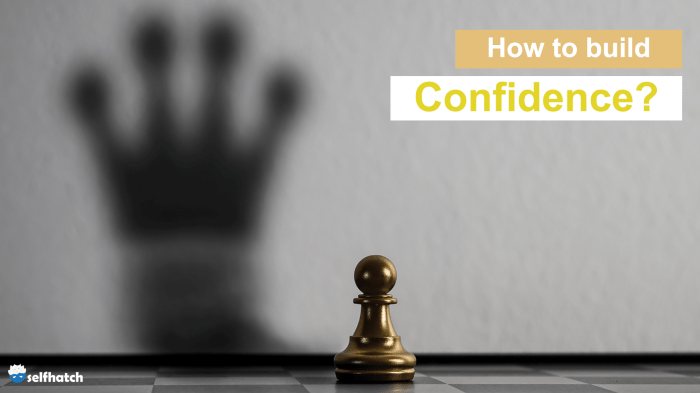Building Self-Confidence: Unleashing Your Inner Power starts with a bang, diving into the world of self-assurance and empowerment. Get ready to explore the secrets to boosting your confidence like never before in this hip and engaging narrative.
Self-confidence plays a crucial role in personal growth and success, influencing every aspect of our lives. From making bold decisions to exuding charisma, confidence is the key to unlocking your full potential.
Introduction to Building Self-Confidence

Self-confidence is the belief in one’s abilities, skills, and judgment. It plays a crucial role in personal development as it empowers individuals to take on challenges, overcome obstacles, and pursue their goals with determination.
Impact of Self-Confidence
- Self-confidence can positively impact mental health by reducing anxiety and increasing resilience in the face of adversity.
- It influences how individuals present themselves to others, affecting their relationships and social interactions.
- Self-confidence can lead to better decision-making as individuals trust their instincts and abilities.
Factors Influencing Self-Confidence: Building Self-Confidence
Building self-confidence is influenced by a variety of factors, both internal and external. These factors can shape an individual’s perception of themselves and their abilities, ultimately impacting their level of self-assurance.Internal Factors:Self-confidence often stems from internal beliefs and attitudes. Positive self-talk, setting achievable goals, and recognizing personal strengths are key internal factors that contribute to building self-confidence. When individuals have a strong sense of self-worth and belief in their capabilities, they are more likely to exude confidence in various aspects of their lives.External Factors:External factors such as social support, encouragement from others, and opportunities for success can also play a significant role in boosting self-confidence.
Surrounding oneself with positive and uplifting individuals, receiving constructive feedback, and being recognized for accomplishments can all contribute to a person’s overall confidence levels. On the other hand, negative influences, criticism, and lack of support can hinder the development of self-confidence.Past Experiences and Self-Confidence:Past experiences, especially during childhood and adolescence, can have a lasting impact on an individual’s self-confidence. Traumatic events, repeated failures, or instances of bullying can negatively affect self-esteem and confidence levels.
Conversely, positive experiences, achievements, and supportive relationships can help build a strong foundation of self-confidence that carries into adulthood.
Impact of Childhood Experiences
Childhood experiences, whether positive or negative, can significantly shape an individual’s self-confidence. Children who receive praise, support, and encouragement from caregivers are more likely to develop a healthy sense of self-esteem and confidence. On the other hand, children who experience neglect, abuse, or constant criticism may struggle with self-confidence issues later in life.
Social Comparison and Self-Confidence
Social comparison, or comparing oneself to others, can impact self-confidence. Constantly measuring one’s worth based on external factors or comparing achievements to those of others can lead to feelings of inadequacy and low self-esteem. It’s important for individuals to focus on their own progress and growth rather than constantly seeking validation from external sources.
Strategies for Building Self-Confidence
Building self-confidence is crucial for personal growth and success. By taking practical steps and implementing effective strategies, individuals can enhance their self-esteem and achieve their goals with confidence.
Role of Positive Affirmations and Self-Talk, Building Self-Confidence
Positive affirmations and self-talk play a significant role in boosting self-confidence. By practicing daily affirmations and replacing negative thoughts with positive ones, individuals can rewire their mindset and build a more optimistic outlook. Remember, “I am capable,” “I believe in myself,” and “I deserve success” are powerful affirmations that can bolster self-confidence.
Tips for Setting Achievable Goals
Setting achievable goals is essential for strengthening self-confidence. Start by setting small, realistic goals that are within reach. Break down larger goals into manageable tasks and celebrate each accomplishment along the way. By setting SMART goals (Specific, Measurable, Achievable, Relevant, Time-bound), individuals can track their progress and boost their confidence as they work towards success.
Overcoming Self-Doubt and Fear

Self-doubt and fear are often closely linked to self-confidence. When individuals doubt their abilities or fear failure, it can significantly impact their self-confidence. These negative feelings can create a cycle where self-doubt and fear feed into each other, further eroding one’s confidence.
Techniques for Managing Self-Doubt and Overcoming Fears
- Challenge negative thoughts: Recognize when self-doubt or fear creeps in and challenge those thoughts with positive affirmations or evidence of past successes.
- Set realistic goals: Break down big goals into smaller, achievable steps to build confidence and reduce feelings of overwhelm.
- Practice self-care: Taking care of your physical and mental well-being can help boost your self-confidence and resilience in the face of doubts and fears.
- Seek support: Talk to friends, family, or a therapist about your feelings of self-doubt and fear to gain perspective and guidance.
Stories of Individuals Who Conquered Self-Doubt
“I used to doubt my abilities as an artist, but after receiving positive feedback from clients and putting myself out there, I gained the confidence to pursue my passion full-time.”
“Fear of public speaking held me back for years, but through practice and exposure, I overcame my anxieties and now confidently deliver presentations at work.”